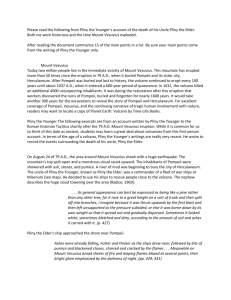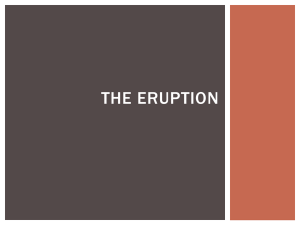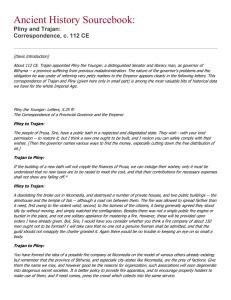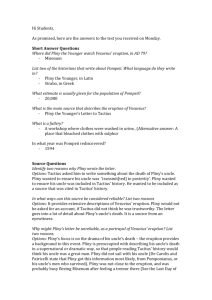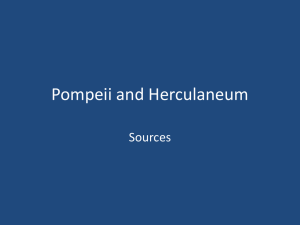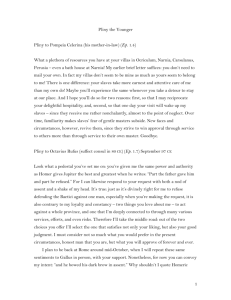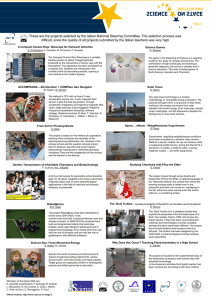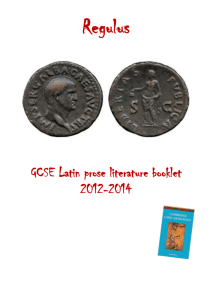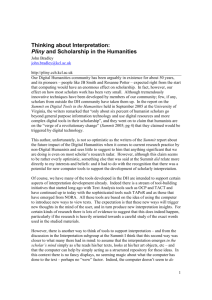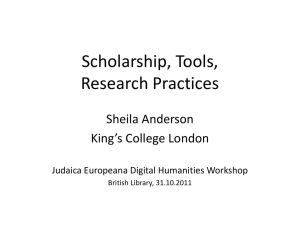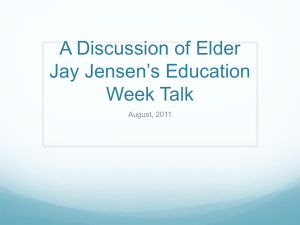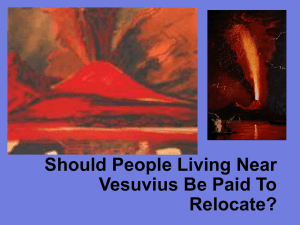Close Reading questions for Pliny`s letters to Tacitus about the
advertisement
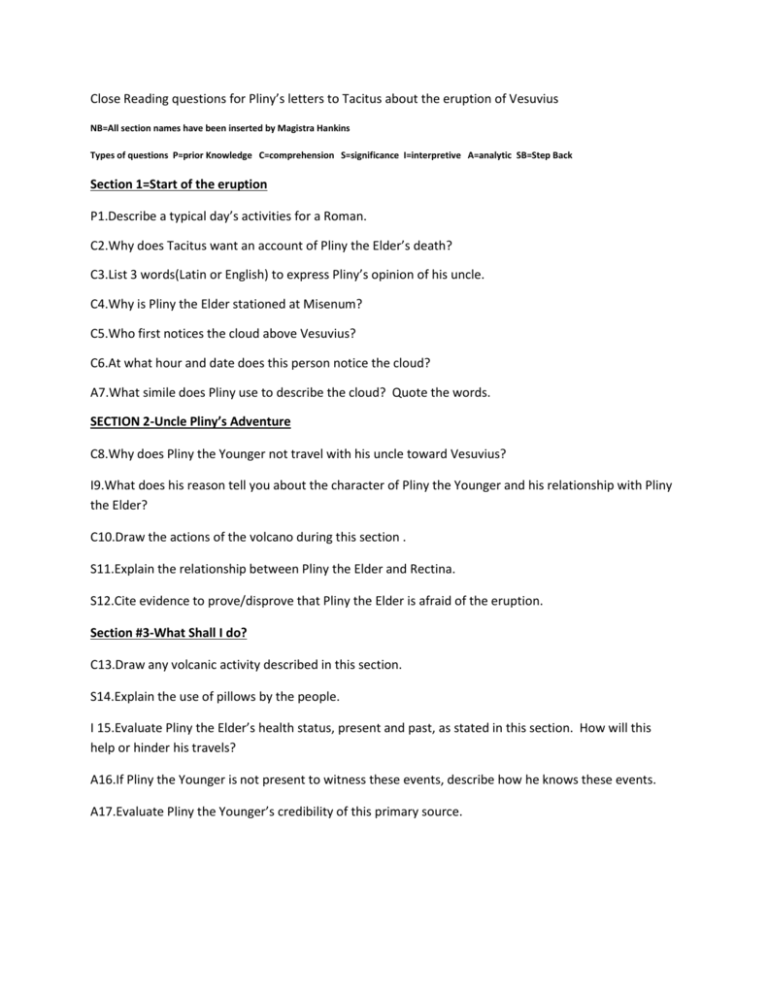
Close Reading questions for Pliny’s letters to Tacitus about the eruption of Vesuvius NB=All section names have been inserted by Magistra Hankins Types of questions P=prior Knowledge C=comprehension S=significance I=interpretive A=analytic SB=Step Back Section 1=Start of the eruption P1.Describe a typical day’s activities for a Roman. C2.Why does Tacitus want an account of Pliny the Elder’s death? C3.List 3 words(Latin or English) to express Pliny’s opinion of his uncle. C4.Why is Pliny the Elder stationed at Misenum? C5.Who first notices the cloud above Vesuvius? C6.At what hour and date does this person notice the cloud? A7.What simile does Pliny use to describe the cloud? Quote the words. SECTION 2-Uncle Pliny’s Adventure C8.Why does Pliny the Younger not travel with his uncle toward Vesuvius? I9.What does his reason tell you about the character of Pliny the Younger and his relationship with Pliny the Elder? C10.Draw the actions of the volcano during this section . S11.Explain the relationship between Pliny the Elder and Rectina. S12.Cite evidence to prove/disprove that Pliny the Elder is afraid of the eruption. Section #3-What Shall I do? C13.Draw any volcanic activity described in this section. S14.Explain the use of pillows by the people. I 15.Evaluate Pliny the Elder’s health status, present and past, as stated in this section. How will this help or hinder his travels? A16.If Pliny the Younger is not present to witness these events, describe how he knows these events. A17.Evaluate Pliny the Younger’s credibility of this primary source. Section #4-Mother and I Now (2nd letter is numbered by section and line number.) C18.Describe the death of Pliny the Elder. A19.Why would Pliny add the following to the close of the letter? What is he trying to tell Tacitus? “…that I have related only that I myself witnessed or what I heard immediately afterward, when the truest accounts are given” I20.Explain the difference in “to write a letter and to write a history.” C21.Why does he write the second letter to Tacitus? Section 5-What Shall I Do? C22.List Pliny’s actions after his uncle leaves to investigate the volcano. C23.What reason does he give for completing any of these actions? C24.Unbeknownst to Pliny the Elder or Younger, what had been a sign of an impending eruption of Vesuvius? S25.Why were the people not scared of this unknown sign of an impending eruption? C26.From the night of Aug. 24-morning of Aug. 25, 79AD, draw Vesuvius’ actions. C27.What event finally causes Pliny et al. to leave Misenum? I28.Compare and contrast Pliny the Younger’s and Pliny the Elder’s activities in wake of the eruption. Section 6-Rock n” Roll C 29.Give Pliny’s description of a.earthquake______________________________________________________________________ b.tsunami ________________________________________________________________________ c.pyroclastic surge ______________________________________________ I30.Interpret mother’s character when she uses the words “to plead, urge, and order me to make my escape….” S31.What words/actions finally convince Pliny et mater to flee? S32.Describe the effects of the “dense fog” on the people and the land. A33.In this section especially, why would Pliny change his subject of verbs from I” to “we?” Section 7-The End S34.Describe universal human emotions during the eruption. A35.Why would Pliny discuss these universal emotions at the end of the letter? S36.Why are some people calling upon the gods? A37.Explain human nature in the following: “Men appeared who reported that part of Misenum was buried in ruins, and part of it in flames; it was false, but found credulous listeners” (15). C38.Record Pliny’s description of the last pyroclastic surge. C39.Describe what Pliny saw when the darkness lifted. S40.Pliny et al. suffer from Post-Traumatic Stress Syndrome. Locate evidence to prove or disprove this. Concluding questions C1.Who survived the eruption of Mt. Vesuvius? SB2.How valuable is Pliny’s eyewitness account of this natural event? SB3.How can scientists, volcanologists, geologists, biologists, anthropologists et al. use this account to prove or disprove Pliny’s facts? SB4Which volcanic details could be proved or disproved? SB5.”The dismayed crowd came after us; it preferred following someone else’s decision rather than its own; in panic that is practically the same as wisdom” (section 5 in 2nd letter). What is the antecedent of the personal pronoun “it?” Explain what Pliny means about the crowd of people. Is this same crowd mentality present today? If so, where could one find this same behavior?
